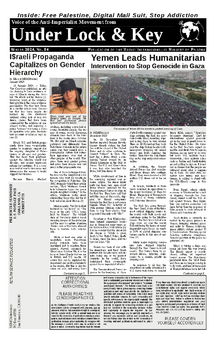
Federal Prisons and Prison Labor
I am a federal prisoner confined to the Coleman II United States Penitentiary. In most federal penitentiaries there are approximately 1500 prisoners in the general population. Approximately 90% of general population prisoners hold prison employment working jobs that range from being cooks in the kitchen, providing janitorial work throughout the prison, working in the maintenance department as electricians or plumbers, or in the most coveted of prison jobs: the UNICOR factory.
Prisoners are compelled to work in two ways. First, the administration utilizes the Financial Responsibility Program to coerce prisoners to work. All convicted Federal prisoners are assessed $100 per count for the crimes for which they are convicted. Many others are given fines, restitution and other "criminal monetary penalties" at sentencing. When a prisoner arrives to the Federal Bureau of Prisons, s/he is required to pay these "financial obligations" during incarceration through the Financial Responsibility Program or face loss of privileges such as commissary, telephone, visitation access, etc. A prisoner must obtain prison employment to meet these so-called obligations in order to keep his/her ability to maintain community contacts through visits and phone calls and to supplement the horrid diet through the commissary.
The second means of lawful but unjust enslavement of the prison population is through disciplinary action. A prisoner who refuses to work is, under prison rules and regulations, "refusing to program." Violating this rule also results in loss of privileges but has additional adverse consequences such as loss of "Good Conduct Time," time in disciplinary segregation, impoundment of personal property, and other sanctions.
It is without doubt that if the federal government had to pay wages to unincarcerated laborers, the cost of cleaning, maintaining and repairing prisons would be extraordinary. It is much easier to run the gulags of America when you prey upon the incarcerated poor and offer them $12 a month to work 8 hour, 5 day workweeks.
This does not account for the UNICOR laborers. UNICOR, also known as Federal Prison Industries, manufactures uniforms, kevlar helmets, furniture, armored cars, and other materials for the U.S. military. Prisoners are paid a maximum of $125 a month but can make hundreds in overtime. To the average prisoner such wages are too tempting to pass up. They don't realize they are fuel for the capitalist military industrial complex which saves hundreds of millions of dollars making military material and products in prisons.
Prisons may not reap profits but they do save costs with prison labor which, considering the amount saved, is tantamount to profits. It is certainly a basic tenet of the criminal injustice system and helps the government run its oppression camps by not having to tax the average citizen to run these torture chambers. Nothing grabs the attention of Americans more than taxes, more prison labor means more prisons without more taxes.








